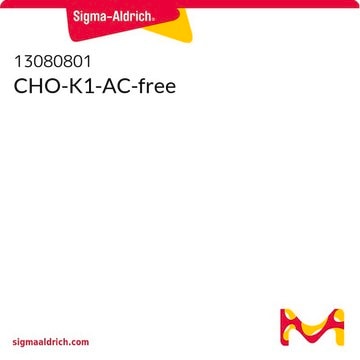CHO-K1 Cell Line from hamster
85051005, hamster ovary, Epithelial
Synonym(s):
CHO cell clone K1 Cells, CHOK1 Cells
About This Item
Recommended Products
Product Name
CHO-K1 Cell Line from hamster, 85051005, from hamster ovary
biological source
hamster ovary
growth mode
Adherent
karyotype
Hypodiploid, modal no. 20
morphology
Epithelial
products
Not specified
receptors
Not specified
technique(s)
cell culture | mammalian: suitable
shipped in
dry ice
storage temp.
−196°C
Cell Line Origin
Cell Line Description
Application
Subculture Routine
Other Notes
related product
Choose from one of the most recent versions:
Certificates of Analysis (COA)
Sorry, we don't have COAs for this product available online at this time.
If you need assistance, please contact Customer Support.
Already Own This Product?
Find documentation for the products that you have recently purchased in the Document Library.
Articles
Eukaryotic cell lines aid in complex post-translational modifications and folding of recombinant proteins. Find suitable recombinant protein production cell lines.
Our team of scientists has experience in all areas of research including Life Science, Material Science, Chemical Synthesis, Chromatography, Analytical and many others.
Contact Technical Service






